Museum, Field, Metropolis, Colony: Practices of Social Governance
Researchers: Professor Tony Bennett , Dr Fiona Cameron, Professor Nélia Dias (opens in a new window), Dr Ben Dibley, Dr Ira Jacknis, Dr Rodney Harrison (opens in a new window), Dr Conal McCarthy (opens in a new window)
Funding: Australian Research Council (opens in a new window), Discovery Project
Period: 2011-2014
» Fact sheet (opens in a new window)(PDF, 203KB)
Warning: Aboriginal and Torres Strait Islander visitors to the website please note this page contains images of Indigenous people who are now deceased.
Introduction
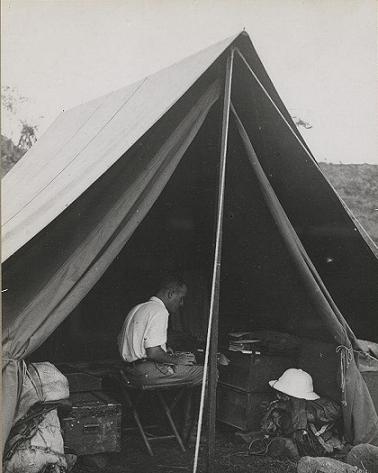
Above: Michel Leiris typing the first report on the Dakar-Djibouti Mission, 13 May 1932. © 2011. Musée du quai Branly/Scala, Florence.
This project studies early twentieth-century museums in Australia, Europe, North America and New Zealand. It investigates the new relationships between museums, anthropological fieldwork and social governance that emerged over this period. What roles did anthropology museum collections play in metropolitan public spheres? What roles did they play in relation to the governance of colonised populations? How did these roles vary across different colonial contexts? In addressing these questions the project explores their relevance to contemporary debates and practices focused on the relations between museums and Indigenous peoples. It is assisted in this by an Indigenous Advisory Committee in Australia and an Indigenous Reference Group in New Zealand.
Background and Approach
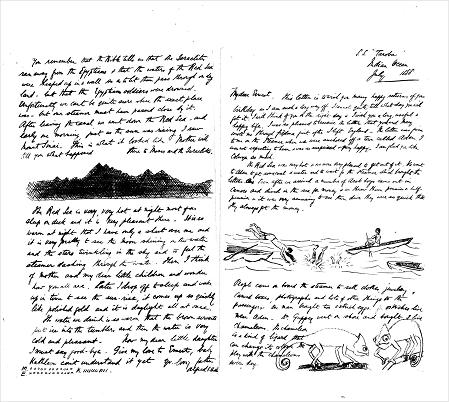
Above: Pages from A C Haddon's journal kept on the Torres Strait Expedition, 1888-1889. Alfred C Haddon. Mitchell Library, State Library of NSW [PMB 959].
Since the 1980s there have been significant changes to museum practices and policies that are designed to promote their use as civic institutions for fostering cross-cultural understanding in culturally diverse societies. Museums in Australia, the United States, France, Britain and New Zealand have developed new relationships with the cultures of both Indigenous peoples and multicultural populations. These museum practices are commonly presented as breaking with the roles played by museums in the nineteenth and early twentieth centuries, when cultural differences were represented in racialised hierarchies. While true in some contexts, this neglects the varying conceptions of cultural difference associated with the new relationships between museums, anthropological fieldwork, and programs of colonial governance that were developed over this period. This study addresses this deficiency by examining these aspects of museum practices in Australia, Britain, France, New Zealand, and North America.
The aims of the project are to:
- identify how museums became more closely involved in the governance of colonised populations, and examine the significance of new conceptions of cultural difference in this regard;
- examine the differences and similarities between the roles of museums in these respects in settler and conquest colonial contexts;
- identify how museums articulated a difference between liberal and colonial forms of government in relation to metropolitan and colonial populations;
- consider the implications of these questions for contemporary museum practices and articulations of Indigenous agency; and
- to develop and apply new methods for the analysis of museum practices by exploring the productive connections between governmentality theory, assemblage theory, actor-network theory and cultural capital theory.
Case Studies
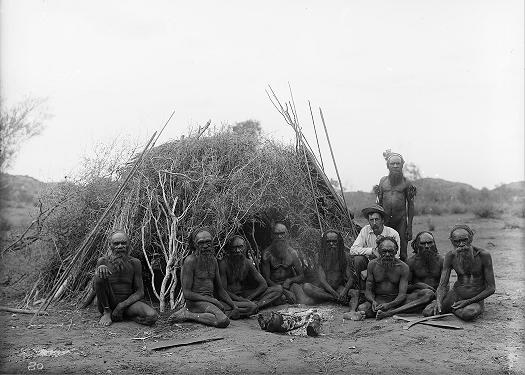
Above: Baldwin Spencer seated with the Arrernte elders, Alice Springs, Central Australia, 1896'. Photographers W. B. Spencer, and F. J. Gillen. Photograph courtesy Museum Victoria. XP14279.
The project advances a range of case studies that explore how significant developments in the practices of collecting cultures became implicated in the rationalities of government. These include:
- the famous Torres Strait Expeditions and the influence of their team members, particularly Alfred Cort Haddon, in developing anthropology in Britain and the Commonwealth as a university discipline and an administrative science and in popularizing the subject through public museums
- Baldwin Spencer's and Frank Gillen's seminal fieldwork in Central Australia and the Northern Territory and Spencer's roles as director of the Museum of Victoria and as Protector of Aborigines
- Franz Boas' involvement in the Jesup North Pacific Expedition, his innovative curatorial work at the American Museum of Natural History, and his influence on the early development of multiculturalism in the United States: the role of the American Museum of Natural History in relation to later fieldwork expeditions to the Plains and Southwest of the US
- Paul Rivet's and Georges Henri Rivière's pivotal roles in the establishment of the Musée de l'Homme and the Musée des Arts et Traditions Populaires and the relationship of French ethnology to the study and display of provincial folklore and to the administration of French West Africa and Indo-China
- Mass-Observation and the importance of that project's 'Anthropology at Home' in the development of new forms of cultural governance in the United Kingdom
- Māori and Polynesian ethnography as it developed under the auspices of New Zealand museums, particularly Wellington's Dominion Museum and the Otago Museum at Dunedin, and how that knowledge flowed into that nation's assimilation policies and the administration of its Pacific dependencies.
Theoretical Orientation
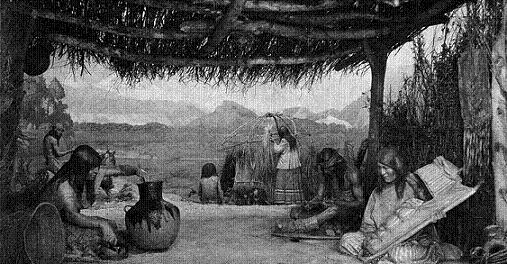
Above: Diorama depicting Apache life in Arizona, Southwest Hall. American Museum of Natural History, November 1924. Courtesy of AMNH Library, 310795.
This project develops and applies new methods for the analysis of museum practices by exploring the relations between governmentality theory, assemblage theory, actor-network theory and cultural capital theory. Drawing on Michel Foucault's notion of governmentality, the project investigates the ways in which ethnographic knowledges associated with the case studies examined are layered into various practices that target conduct: whether it be, for example, exhibitions and education programmes that seek to shape metropolitan public opinion with regard to colonized others; or colonial administrative practices that would aim to govern the colonised through Indigenous custom. Bruno Latour's account of 'the circulation of reference' between the field and the laboratory informs the project's analysis of the flows from the site of anthropological fieldwork through the museum and back to the field via ethnographically informed practices of colonial administration, and of the flows from the field through the museum to the public via exhibition and education programmes. Pierre Bourdieu's concept of cultural capital supplies critical leverage on the ways in which ethnographic competencies come to establish and distinguish the ethnographic authority of particular cultural and political elites in both metropolitan and colonial contexts.
Ethical Protocols
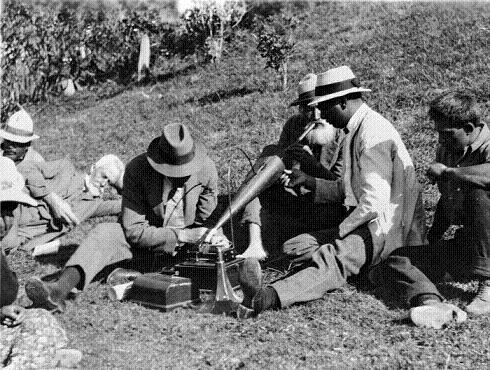
Above: Elsdon Best recording Iehu Nukunuku playing a flute, 1923 Elsdon Best (lying on his side to the left) records Iehu Nukunuku playing a flute, taken 1923 by J McDonald probably in Poverty Bay Region. The man second from left is possibly Sir Peter Buck. Courtesy of the National Library of New Zealand, Reference Number: 1/2-015842-F (opens in a new window).
In collaboration with the Indigenous Advisory Committee the project will ensure that the research conducted accords with established protocols for research on materials relating to Indigenous communities in Australia. The role of the Committee is to: (i) Contribute to and advise the research team on varying perspectives on the research topic; (ii) Advise the research team on the development of appropriate protocols for the conducting of the research in so far as it bears upon relations with indigenous communities; (iii) Advise and work with the research team with the development of the Symposium in 2013; (iv) Develop strategies to disseminate project findings through the Indigenous academic domain and (v) more generally to Indigenous communities through appropriate media. Similarly, the establishment of an Indigenous Reference Group in New Zealand will ensure that the ethical protocols for research on Indigenous materials are observed.
Principles of ethical research
In its research activities the project follows the AIATSIS Guidelines for Ethical Research (opens in a new window)and is guided by the following principles:
Principle 1: Recognition of the diversity and uniqueness of peoples, as well as of individuals, is essential
Principle 2: The rights of Indigenous peoples to self-determination must be recognised.
Principle 3: The rights of Indigenous peoples to their intangible heritage must be recognised.
Principle 4: Rights in the traditional knowledge and traditional cultural expressions of Indigenous peoples must be respected, protected and maintained.
Principle 5: Indigenous knowledge, practices and innovations must be respected, protected and maintained.
Principle 6: Consultation, negotiation and free, prior and informed consent are the foundations for research with or about Indigenous peoples.
Principle 7: Responsibility for consultation and negotiation is ongoing.
Principle 8: Consultation and negotiation should achieve mutual understanding about the proposed research.
Principle 9: Negotiation should result in a formal agreement for the conduct of a research project.
Principle 10: Indigenous people have the right to full participation appropriate to their skills and experiences in research projects and processes.
Principle 11: Indigenous people involved in research, or who may be affected by research, should benefit from, and not be disadvantaged by, the research project.
Principle 12: Research outcomes should include specific results that respond to the needs and interests of Indigenous people.
Principle 13: Plans should be agreed for managing use of, and access to, research results.
Principle 14: Research projects should include appropriate mechanisms and procedures for reporting on ethical aspects of the research and complying with these guidelines.
People and Institutions
The Project Team
Researchers:
- Tony Bennett Chief Investigator 1
- Fiona Cameron, Chief Investigator 2
- Nélia Dias, Partner Investigator
- Ben Dibley, Research Associate
- Ira Jacknis, Partner Investigator*
- Rodney Harrison, Partner Investigator
- Conal McCarthy, Partner Investigator
*Ira Jacknis is Research Anthropologist at the Phoebe A. Hearst Museum of Anthropology, and adjunct professor of Anthropology and Folklore, University of California at Berkeley. He received his Ph.D. in anthropology from the University of Chicago (1989). Before coming to Berkeley in 1991, he worked at the Brooklyn Museum, the Field Museum, the Newberry Library, and the Smithsonian Institution. His research interests include the art and culture of the Native peoples of Western North America, the history of anthropology, museums, and the ethnographic media of still photography, film, and sound recording. He is the author of The Storage Box of Tradition: Kwakiutl Art, Anthropologists, and Museums, 1881-1981 (Smithsonian, 2002), Carving Traditions of Northwest California (Hearst Museum, 1995), and the editor of Food in California Indian Culture (Hearst Museum, 2004), as well as numerous essays.
The Indigenous Advisory Committee
- Phil Gordon, Head of Aboriginal Collections, Australian Museum, (Chair)
- Laura McBride, Education Officer, Australian Museum
- Lyndon Ormond, Parker PhD Student, University of Melbourne
- Garry Pappin, Student, University of Canberra
- Mat Poll, Aboriginal Project Officer, Macleay Museum
- Chris Wilson (opens in a new window), PhD Student/Lecturer, Flinders University
Indigenous Reference Group
- Paul Tapsell, Professor, Te Tumu: School of Māori, Pacific and Indigenous Studies, University of Otago
Partner Institutions
University of California, Berkley (opens in a new window); ISCTE - IUL (opens in a new window); The Open University (opens in a new window); Victoria, University of Wellington (opens in a new window)
Funding: Australian Research Council Discovery Grant
Period: 2011-2014
Events
Past events
Museums, Collecting, Agency: A Symposium, 2014
The Institute for Culture and Society together with Australian Museum, the Heritage Studies Programme at Victoria University of Wellington and the Museum and Heritage Program at the University of Sydney hosted Museum, Collecting, Agency: a symposium on April 1-2, 2014.
The symposium explored questions of agency as they relate to museum and museum-like practices of collecting, particularly in connection with histories of colonialism and their legacies. In this it contributed to lively engagements within museum scholarship on the role of objects and colonialism. Advancing these discussions the symposium focused on the question of agency and its implications for understanding ethnographic museum collections and collecting practices. Recent scholarship exploring the agency of Indigenous subjects in the processes of anthropological collecting has de-individuated the work of anthropology in the formation of ethnographic collections and anthropological knowledge, establishing them not as the exclusive output of the European scientist-collector, but rather as a product of collaboration and contestation made in exchange between anthropologists and Indigenous subjects. The symposium continued this trajectory by turning attention to the range of human and non-human actors involved in ethnographic museum collections. In this it sought to investigate the ways in which the agency of such collections come to be distributed across human subjects and non-human entities, such as objects, tools, technologies, texts, theories and cosmologies. Investigating the friction as well as the flows of their agency, the symposium explored the heterogeneous agents through which ethnographic collections come to be assembled.
- Artist and writer Stephanie Radok attended the symposium and published an article in Artlink: 'Watching the river flow' (opens in a new window).
- Tanya Zoe Robinson published a report on the symposium: Robinson, TZ 2014, 'Museums, Collecting, Agency: A Symposium', Museum Worlds: Advances in Research (opens in a new window), vol. 2, no. 1.
Colonial Governmentalities workshop, 2012
This workshop investigated the ways in which the processes of collecting cultures are implicated in the rationalities of government in various late nineteenth and early twentieth century colonial contexts. The roles played by different kinds of knowledge associated with practices of collecting – anthropology, archaeology, folklore studies – in shaping different forms of colonial rule were of particular interest. A case study approach facilitated this exploration, providing the opportunity to compare and contrast the ways in which processes of collecting cultures are implicated in different colonial rationalities in different colonial contexts; be it, for example, those of settler, conquest, or neo-conquest colonialism. The workshop brought together an international group of scholars who share an interest in questions of colonial governmentality and who have expertise in the histories of museums and the practices of collection associated with the colonial experiences of Australia, France, Germany, India, New Zealand or North America. The workshop generated papers for an edited collection/special issue which made a significant contribution to the literatures on governmentality, museums and collecting.
- Ben Dibley published a report on the workshop: Dibley, B 2012, 'Colonial Governmentalities: Conference Report' (opens in a new window)(PDF, 4.47MB), History of Anthropology Newsletter, University of Pennsylvania, Philadelphia, vol. 39, no. 2, pp. 16-20.
Project Publications
Edited Volumes
Bennett, T, Dibley, B & Harrison, R (eds) 2014, 'Anthropology, collecting and colonial governmentalities', History and Anthropology (opens in a new window), vol. 25, no. 2.
Articles
Cameron, F & McCarthy, C (forthcoming November 2014), 'Two anthropological assemblages: New Zealand museums, native policy, Māori "culture areas" and "adaptation"', Museum & Society, vol. 12, no. 1.
Batty, P 2014, 'The tywerrenge as an artefact of rule: the (post) colonial life of a secret/sacred Aboriginal object', History and Anthropology, vol, 25, no. 2, pp. 296-311.
Bennett, T, Dibley, B & Harrison, R 2014, 'Introduction: anthropology, collecting and colonial governmentalities', History and Anthropology, vol. 25, no. 2, pp. 137-149.
Bennett, T 2014, 'Liberal government and the practical history of anthropology', History and Anthropology, vol. 25, no. 2, pp. 150-170.
Cameron, F 2014, 'From "dead things" to immutable, combinable mobiles: H.D. Skinner, the Otago Museum and University and the governance of Māori populations' (opens in a new window), History and Anthropology, vol. 25, no. 2, pp. 208-226.
Dias, N 2014, 'Rivet's mission in colonial Indochina (1931–1932) or the failure to create an ethnographic museum', History and Anthropology, vol. 25, no. 2, pp. 189-207.
Dibley, B 2014, 'Assembling an anthropological actor: anthropological assemblage and colonial government in Papua', History and Anthropology, vol. 25, no. 2, pp. 263-279.
Edwards, E 2014, 'Photographic uncertainties: between evidence and reassurance', History and Anthropology, vol. 25, no. 2, pp. 171-188.
Harrison, R 2014, 'Observing, collecting and governing "ourselves" and "others": Mass-Observation's fieldwork agencements', History and Anthropology, vol. 25, no. 2, pp. 227-245.
McCarthy, C 2014, '"Empirical anthropologists advocating cultural adjustments": the anthropological governance of Āpirana Ngata and the Native Affairs Department', History and Anthropology, vol. 25, no. 2, pp. 280-295.
Rowse, T 2014, '"Rooted in demographic reality": the contribution of New World censuses to Indigenous survival', History and Anthropology, vol. 25, no. 2, pp. 246-262.
Book Chapters
McCarthy, C (forthcoming 2015), 'Historicising the "indigenous international": Museums, anthropology, and transpacific networks', in E Duerr & Philipp Schorch (eds), TransPacific Americas: encounters and engagements between the Americas and the South Pacific, Routledge, London & New York.
McCarthy, C (forthcoming 2014), '"Two branches of the brown Polynesians": ethnological fieldwork, colonial governmentality and the "dance of agency"', in K Pickles & C Coleborne (eds), New Zealand's empire, Manchester University Press, London & New York.
Bennett, T 2013, 'Collecting, instructing, governing: fields, publics, milieus', in T Bennett, Making culture, changing society, Routledge, London & New York, pp. 99-108.
Bennett, T 2013. 'Making and mobilizing worlds: assembling and governing the Other', in T Bennett, Making culture, changing society, Routledge, London & New York, pp. 73-87.
Bennett, Tony 2013, 'The "shuffle of things" and the distribution of agency', in R Harrison, S Byrne & A Clarke (eds), Reassembling the collection: ethnographic museums and Indigenous agency, SAR Press, Santa Fe, pp. 39-59.
Harrison, R 2013, 'Reassembling ethnographic museum collections', in R Harrison, S Byrne & A Clarke (eds), Reassembling the collection: ethnographic museums and Indigenous agency, SAR Press, Santa Fe, pp. 3-35.
Jacknis, I (in press), 'In the field / en plein air: the art of anthropological display at the American Museum of Natural History, 1905–30', in E Hasinoff & J Bell (eds), Anthropology of expeditions: travel, visualities, after-lives, Bard Graduate Cemusuenter & the University of Michigan Press, New York & Ann Arbor.




